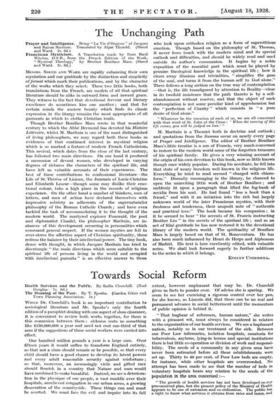The Unchangin g 0 . Path MESSRS. SIEEED AND WARD are rapidly
enhancing their own reputation and our gratitude by the distinction and simplicity of formed which mark their publications, and by the character of the works which they select. These two little books, both translations from the French, are models of all that spiritual literature should be alike in outward form and inward grace.
They witness to the fact that devotional fervour and literary excellence do sometimes kiss one another ; and that for certain minds the austere beauty which finds its classic expression in the liturgy remains the most appropriate of all garments in which to clothe Christian truth.
Though Brother Boniface Macs wrote in that wonderful
century to which the Abbe Bremond has devoted his Histoire Litteraire, whilst M. Maritain is one of the most distinguished
of living philosophers, we may regard both these books as evidences of that continued interest in mystical religion which is so marked a feature of modern French Catholicism.
This revival, which dates from the close of the last century, has followed two main directions. On one hand it produced a succession of devout women, who developed in varying degrees of richness the characters of the spiritual life, and have left us valuable accounts of their experiences. The best of these contributions to confessional literature—the Life of St. Therese of Lisieux, the Journals of Lucie-Christine and Elizabeth Leseur—though some may dislike their emo- tional colour, take a high place in the records of religious experience. On the other hand a number of thinkers, men of letters, and men of action have declared themselves with impressive sobriety as adherents of the supernaturalist philosophy of the Roman Catholic Church ; and have even tackled the task of accommodating it to the thought of the modern world. The martyred explorer Foucauld, the poet and diplomatist Claudel, the philosopher Maritain, are in- stances of this development occurring in personalities which command general respect. If the women mystics are felt to over-stress the affective aspect of Christian spirituality, these redress the balance by their intellectual power. The tiny book, dense with thought, in which Jacques Maritain has tried to disentangle "the main directions which seem suitable to the spiritual life of persons living in the world and occupied with intellectual pursuits" is an effective answer to those • who look upon orthodox religion as a form of superstitious emotion. Though based on the philosophy of St. Thomas, it never loses touch with the modern mind and its special outlook and difficulties, and should be widely read and used outside its author's communion. It begins by a noble exposition of the essential part which must be played by genuine theological knowledge in the spiritual life ; how it clears away illusions and trivialities, "simplifies the gaze of the soul, and turns it from the human self to God alone." There follows a long section on the true way of contemplation —that is, the life transfigured by attention to Reality—clear in its twofold insistence that the path thereto is by a self.. abandonment without reserve, and that the object of such • contemplation is not some peculiar kind of apprehension but the "perfection of Charity" which consists in "a pure desire of God alone."
"Whatever be the vocation of each of us, we are all concerned with that word of St. John of the Cross : 'When the evening of this life comes, you will be judged on love."' M. Maritain is a Thomist both in doctrine and outlook ; and quotations from the Summa occur on nearly every page of Prayer and Intelligence. The editor of Brother Boniface Maes's little treatise is a son of Francis, very much concerned to restore to the modern world some of the forgotten treasures of his spiritual family. He gives a very winning account of the origin of his own devotion to this book, now so little known though once widely popular. During his novitiate, he fell into that state of weary boredom well known in the religious life. Everything he tried to read seemed "charged with chloro- form." Dismally rummaging in the library, he chanced to open the uninviting little work of Brother Boniface ; and suddenly lit upon a paragraph that lifted the fog-bank of accidia from his soul. He had found "less a book than a friend," and with it an initiation into the rich but largely unknown world of the later Franciscan mystics, with their freshness and tenderness, their unspoilt note of "authentic and practical love." The book became his companion ; in it he seemed to hear "the accents of St. Francis instructing Brother Leo" in the secrets of the spiritual life ; and as an act of filial gratitude he has now restored it to the devotional library of the modern world. The spirituality of Boniface Macs is largely based on that of St. Bonaventura. He has also been much influenced by Henri de Herps and Alphonsus of Madrid. His text is here excellently edited, with valuable notes. We shall look forward eagerly to further additions to the series to which it belongs.
EVELYN UNDERHILL.
































 Previous page
Previous page